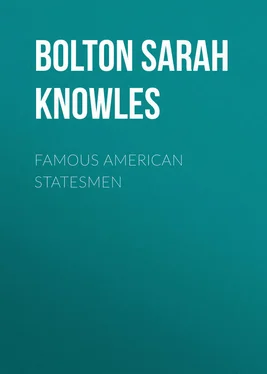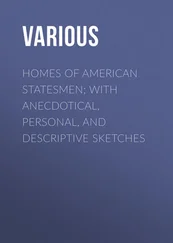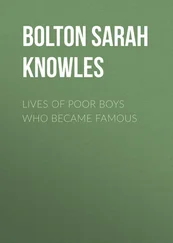Sarah Bolton - Famous American Statesmen
Здесь есть возможность читать онлайн «Sarah Bolton - Famous American Statesmen» — ознакомительный отрывок электронной книги совершенно бесплатно, а после прочтения отрывка купить полную версию. В некоторых случаях можно слушать аудио, скачать через торрент в формате fb2 и присутствует краткое содержание. ISBN: , Жанр: foreign_prose, foreign_antique, foreign_language, на английском языке. Описание произведения, (предисловие) а так же отзывы посетителей доступны на портале библиотеки ЛибКат.
- Название:Famous American Statesmen
- Автор:
- Жанр:
- Год:неизвестен
- ISBN:http://www.gutenberg.org/ebooks/39012
- Рейтинг книги:5 / 5. Голосов: 1
-
Избранное:Добавить в избранное
- Отзывы:
-
Ваша оценка:
- 100
- 1
- 2
- 3
- 4
- 5
Famous American Statesmen: краткое содержание, описание и аннотация
Предлагаем к чтению аннотацию, описание, краткое содержание или предисловие (зависит от того, что написал сам автор книги «Famous American Statesmen»). Если вы не нашли необходимую информацию о книге — напишите в комментариях, мы постараемся отыскать её.
Famous American Statesmen — читать онлайн ознакомительный отрывок
Ниже представлен текст книги, разбитый по страницам. Система сохранения места последней прочитанной страницы, позволяет с удобством читать онлайн бесплатно книгу «Famous American Statesmen», без необходимости каждый раз заново искать на чём Вы остановились. Поставьте закладку, и сможете в любой момент перейти на страницу, на которой закончили чтение.
Интервал:
Закладка:
Coming across an odd volume of the "Spectator," Benjamin was captivated by the style, and resolved to become master of the production, by rewriting the essays from memory, and increasing his fulness of expression by turning them into verse, and then back again into prose.
James Franklin was now printing the fifth newspaper in America. It was intended to issue the first — Publick Occurrences – monthly, or oftener, "if any glut of occurrences happens." When the first number appeared, September 25, 1690, a very important "occurrence happened," which was the immediate suspension of the paper for expressions concerning those in official position. The next newspaper, – the Boston News-Letter , – a weekly, was published April 24, 1704; the third was the Boston Gazette , which James was engaged to print, but, being disappointed, started one of his own, August 17, 1721, called the New England Courant . The American Weekly Mercury was printed in Philadelphia six months before the Courant .
Benjamin's work was hard and constant. He not only set type, but distributed the paper to customers. "Why," thought he, "can I not write something for the new sheet?" Accordingly, he prepared a manuscript, slipped it under the door of the office, and the next week saw it in print before his eyes. This was joy indeed, and he wrote again and again.
The Courant at last gave offence by its plain speaking, and it ostensibly passed into Benjamin's hands, to save his brother from punishment. The position, however, soon became irksome, for the passionate brother often beat Benjamin, till at last he determined to run away. As soon as this became known, James went to every office, told his side of the story, and thus prevented Benjamin from obtaining work. Not discouraged, the boy sold a portion of his precious books, said good-bye to his beloved Boston, and went out into the world to more poverty and struggle.
Three days after this, he stood in New York, asking for work at the only printing-office in the city, owned by William Bradford. Alas! there was no work to be had, and he was advised to go to Philadelphia, nearly one hundred miles away, where Andrew Bradford, a son of the former, had established a paper. The boy could not have been very light-hearted as he started on the journey. After thirty hours by boat, he reached Amboy, and then travelled fifty miles on foot across New Jersey. It rained hard all day, but he plodded on, tired and hungry, buying some gingerbread of a poor woman, and wishing that he had never left Boston. His money was fast disappearing.
Finally he reached Philadelphia.
"I was," he says in his autobiography, "in my working dress, my best clothes being to come round by sea. I was dirty from my journey; my pockets were stuffed out with shirts and stockings, and I knew no soul nor where to look for lodging. I was fatigued with travelling, rowing, and want of rest. I was very hungry, and my whole stock of cash consisted of a Dutch dollar and about a shilling in copper. The latter I gave the people of the boat for my passage, who at first refused it, on account of my rowing, but I insisted on their taking it; a man being sometimes more generous when he has but a little money than when he has plenty, perhaps through fear of being thought to have but little.
"Then I walked up the street, gazing about, till near the Market-house I met a boy with bread. I had made many a meal on bread, and, inquiring where he got it, I went immediately to the baker's he directed me to, in Second Street, and asked for biscuit, intending such as we had in Boston; but they, it seems, were not made in Philadelphia. Then I asked for a threepenny loaf, and was told they had none such. So, not considering or knowing the difference of money, and the greater cheapness, nor the names of bread, I bade him give me threepenny-worth of any sort. He gave me, accordingly, three great puffy rolls. I was surprised at the quantity, but took it, and, having no room in my pockets, walked off with a roll under each arm, and eating the other.
"Thus I went up Market Street as far as Fourth Street, passing by the door of Mr. Read, my future wife's father; when she, standing at the door, saw me, and thought I made, as I certainly did, a most awkward, ridiculous figure. Then I turned and went down Chestnut Street and part of Walnut Street, eating my roll all the way, and, coming round, found myself again at Market Street wharf, near the boat I came in, to which I went for a draught of the river water; and, being filled with one of my rolls, gave the other two to a woman and her child that came down the river in the boat with us, and were waiting to go farther."
After this, he joined some Quakers who were on their way to the meeting-house, which he too entered, and, tired and homeless, soon fell asleep. And this was the penniless, runaway lad who was eventually to stand before five kings, to become one of the greatest philosophers, scientists, and statesmen of his time, the admiration of Europe and the idol of America. Surely, truth is stranger than fiction.
The youth hastened to the office of Andrew Bradford, but there was no opening for him. However, Bradford kindly offered him a home till he could find work. This was obtained with Keimer, a printer, who happened to find lodging for the young man in the house of Mr. Read. As the months went by, and the hopeful and earnest lad of eighteen had visions of becoming a master printer, he confided to Mrs. Read that he was in love with, and wished to marry, the pretty daughter, who had first seen him as he walked up Market Street, eating his roll. Mr. Read had died, and the prudent mother advised that these children, both under nineteen, should wait till the printer proved his ability to support a wife.
And now a strange thing happened. Sir William Keith, governor of the province, who knew young Franklin's brother-in-law, offered to establish him in the printing business in Philadelphia, and, better still, to send him to England with a letter of credit with which to buy the necessary outfit.
A mine of gold seemed to open before him. He made ready for the journey, and set sail, disappointed, however, that the letter of credit did not come before he left. When he reached England, he ascertained that Sir William Keith was without credit, a vain man and devoid of principle. Franklin found himself alone in a strange country, doubly unhappy because he had used for himself and some impecunious friends one hundred and seventy-five dollars, collected from a business man. This he paid years afterward, ever considering the use of it one of the serious mistakes of his life.
He and a boy companion found lodgings at eighty-seven cents per week; very inferior lodgings they must have been. There was of course no money to buy type, no money to take passage back to America. He wrote a letter to Miss Read, telling her that he was not likely to return, dropped the correspondence, and found work in a printing-office.
After a year or two, a merchant offered him a position as clerk in America, at five dollars a week. He accepted, and, after a three-months voyage, reached Philadelphia, "the cords of love," he said, drawing him back. Alas! Deborah Read, persuaded by her mother and other relatives; had married, but was far from happy. The merchant for whom Franklin had engaged to work soon died, and the printer was again looking for a situation, which he found with Keimer. He was now twenty-one, and life had been anything but cheerful or encouraging.
Still, he determined to keep his mind cheerful and active, and so organized a club of eleven young men, the "Junto," composed mostly of mechanics. They came together once a month to discuss questions of morals, politics, and science. As most of these were unable to buy books – a book in those days often costing several dollars – Franklin conceived the idea of a subscription library, raised the funds, and became the librarian. Every day he set apart an hour or two for study, and for twenty years, in the midst of poverty and hard work, the habit was maintained. If Franklin himself did not know that such a young man would succeed, the world around him must have guessed it. Out of this collection of books – the mother of all the subscription libraries of this country – has grown a great library in the city of Philadelphia.
Читать дальшеИнтервал:
Закладка:
Похожие книги на «Famous American Statesmen»
Представляем Вашему вниманию похожие книги на «Famous American Statesmen» списком для выбора. Мы отобрали схожую по названию и смыслу литературу в надежде предоставить читателям больше вариантов отыскать новые, интересные, ещё непрочитанные произведения.
Обсуждение, отзывы о книге «Famous American Statesmen» и просто собственные мнения читателей. Оставьте ваши комментарии, напишите, что Вы думаете о произведении, его смысле или главных героях. Укажите что конкретно понравилось, а что нет, и почему Вы так считаете.












